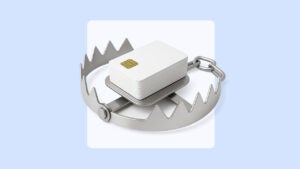Can a credit card charge a late fee on a late fee?

Key takeaways
- Credit card issuers charge late fees when a cardholder misses their payment.
- If you miss multiple payments, you can be charged multiple late fees.
- To avoid a late fee, make sure you pay your bills on time every month.
Credit cards can come with a variety of fees that kick in at different times — and one of the most common types of fees is the late payment fee. Here’s a breakdown of what that fee is and whether you can be charged it on top of another late payment fee.
Late fee meaning: explained
Getting charged a late fee means that you did not pay your credit card issuer the amount owed on your statement balance for that billing cycle in time. Because you were late paying your issuer, they charged you a late fee. If you pay less than the minimum payment due on your card, or if your payment bounces, you may also be charged a late fee.
The Credit Card Accountability Responsibility and Disclosure Act of 2009 (CARD Act) lays out that, as of 2022, a consumer credit card late payment fee cannot be higher than $30 for a first late payment. However, if you make another late payment within the next six billing cycles after that first late payment, your issuer can charge you as much as a $41 penalty for each late payment. A late fee cannot be more than the minimum payment due on the account.
When is a payment considered to be late?
A credit card payment is considered late if you don’t pay by the due date on the account, which typically averages between 21 and 25 days after your billing cycle ends. The lender would have to receive the payment by 5 p.m. on the due date, or any later cut-off time that the lender has specified. If the due date falls on a Sunday or holiday, the payment would not be considered late if it was received by the cut-off time on the next business day.
Here’s how these rules affect different payment methods:
- Mailed payments: Your payment will typically not be considered late so long as your mailed payment is postmarked before the due date has passed.
- Electronic payments: Your payment will typically not be considered late so long as you initiate the payment before the due date, even if the payment doesn’t post until after the due date.
- Phone payments: Your payment will typically not be considered late so long as you initiate the payment before the due date, even if the payment doesn’t post until after the due date.
Keep in mind: Late payment rules vary by issuer and can sometimes be confusing when holidays or weekends are involved. If you’re not sure whether your payment would be considered late, don’t hesitate to call your issuer and ask customer service to clarify their policies.
Can a lender charge a late fee on a late fee?
When you’re charged a late fee, that charge is added to your card’s outstanding balance. Because your late fee is charged this way, your credit card issuer can absolutely charge another late fee on top of the one it already charged you if you wind up missing an additional payment. Any late fee you’re charged will also incur interest just like the rest of your unpaid balance, so you’ll be charged a daily interest rate on the late fee, too.
Consequences of late payments
If you are late making your card payment, there could also be other consequences besides late fees. Those include:
- Credit score damage: Your payment history is the most important factor to your FICO credit score, accounting for 35 percent of your score. If your payment is 30 days past due and your lender reports a late payment on your account to credit reporting bureaus, your credit score will likely fall. That negative input could stay on your credit report for up to seven years. If you fall behind on payment for six months, your issuer might charge off your debt and even send it to collections, damaging your score even further.
- An increased interest rate: If your card terms state that a penalty annual percentage rate (APR) will apply if you’re 60 days late on a payment, for example, you could end up with a higher interest rate that will make it more difficult for you to pay off your outstanding balance.
Bankrate’s take: Talk to your issuer about your late payment to see if you have options. For instance, if you’re typically on time but make an uncharacteristic late payment, you can negotiate with your card issuer to forgive your error — but you’ll have to call ASAP. If you’re having trouble keeping up with your bills, ask your issuer about their financial hardship programs.
In the news: Could credit card late fees go down?
The CARD Act tried to rein in consumer credit card late fees, which were previously unregulated, and initially set them at $25 for a first late payment and $35 for a repeat violation within the next six billing cycles (these caps first kicked in for 2010 and have been adjusted annually to account for inflation, climbing to the current $30 and $41 limits.)
Lenders were provided a safe harbor for abiding by these CARD Act limits. If they wanted to charge more than that, they were required to justify their fees from a cost perspective. That’s why most lenders stick to the safe harbor limits.
The Consumer Financial Protection Bureau (CFPB) finalized a ruling to further cap credit card late fees at just $8, but it was blocked by a federal judge on May 10, 2024. However, given that the Trump administration has shut down the CFPB’s headquarters and is trying to severely limit the consumer watchdog agency’s capacity, it’s unlikely we’ll see much immediate progress by the CFPB to continue fighting for that late fee cap.
The bottom line
If you don’t get your credit card payment in by the due date, you’ll be charged a late fee. This late fee will be added to your outstanding balance, where it’ll incur interest just like the rest of your balance. If you continue to miss payments, you can get charged more late payment fees on top of the one you were already charged.
To avoid late payment fees, make sure you pay your bills on time each month before your grace period expires. Setting up autopay can be a great way to avoid forgetting to pay your bills. If you’re experiencing financial hardship, don’t hesitate to contact your credit card issuer and see what your options are. Depending on the severity of your situation, you should also consider working with a credit counselor to come up with an actionable debt management plan or some other solution.
Why we ask for feedback Your feedback helps us improve our content and services. It takes less than a minute to complete.
Your responses are anonymous and will only be used for improving our website.









